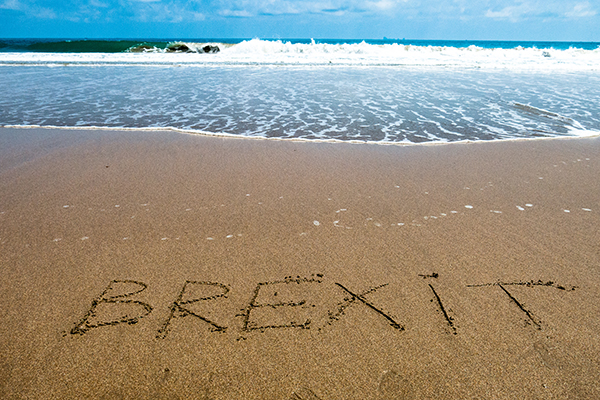One year after the historical outcome of the EU Referendum, this week marks the start of Brexit negotiations. What comes next is anyone's guess.
Like many of you, I am old enough to remember Grexit back in 2012. Funny how things change within a short space of time. Roughly one year after the EU referendum, the PM is trying to prepare her government and the country to begin our imminent divorce from the European Union.
Similar to any other divorce, the stakes are high. The UK must settle separation issues such as alimony payments (i.e. the infamous €100Bn Brexit Bill) ,the rights of EU citizens, agree amicable (hopefully) terms on how to interface with its EU neighbours post Brexit and, most of all, ensure custody of the future growth and prosperity of the UK. This is a tall order.
No doubt humbled by the recent Election outcome the Prime Minister must swallow the pride and arrogance of previous statements and now try to work out the best deal in the interest of the UK and its future. Throughout the campaign, little was said regarding the repercussions of extracting the UK from the second largest economy in the world or our comfortable seat at the EU table. The electorate remains blissfully naïve of the real ripple effects of Brexit and beyond. To say the UK is unprepared is a gross understatement.
As the PM said after the election, it is time to “get to work”. However this message is roughly twelve months too late, the clock is ticking both figuratively and literally. The EU referendum exposed the deep fault lines in British society in terms of identity, socioeconomic standing and place.
Some argue that Brexit was a consequence of the growing economic anxiety felt by so many throughout the country. Anxieties relating to being riddled by debt, cash poor, unable to afford a home and threats to social protection are keeping them up at night. This feels like a tipping point; the deepening distrust of institutions combined with profound fissures in our social contract threatens societal cohesion. The system feels rigged as opportunity narrows and inequality grows. There is no doubt in my mind this will be further exacerbated by Brexit if the root causes are not addressed.
In spite of this I think this is a great opportunity for the UK to confront the painful truths of the UK’s head start in the global economy (largely due to colonialization and the original sins of the transatlantic slave trade), and defines what a Global Britain actually means in the 21st century.
Brexit begins at home
To pilfer a phrase from Richard Haas, President of the Council on Foreign Relations, the UK’s foreign policy must begin at home. The government should focus its attention on building a thriving, inclusive domestic UK economy by addressing the high debt to GDP ratio, low productivity and low paid insecure work. It should invest in infrastructure and human capital throughout the country (not just in urban centres) and create an enabling environment for the flourishing of business and innovation.
This may seem counter intuitive but by focusing on strengthening UK PLC and increasing shared prosperity at home for everyone, I am sure that this will vastly widen the avenues for international engagement.
Do not misunderstand me. I am not advocating for a retreat from the global arena. This new 21st century is characterized by an unpredictable web of the transnational exchanges and rapid pace of technological change, which has impacted every aspect of our lives.
By peering through the lens of history one can observe how change comes quickly, and can significantly alter the economic development of a country. The profitable slave/triangular trade of the 17th & 18th century surrendered to the ubiquitous coal mine of the Industrial Revolution. And today, this has given way to wind turbines and solar panels of the new millennia. Compounding the new state of play are new challenges: transnational criminal organizations, terrorism and virulent viruses and mega bugs. The world is a dangerous place where no one nation can solve its problems on its own.
I believe that the UK must be clever in its negotiating positions. Firstly, it should not wall itself off from its neighbours. What gets lost in the Brexit discussions is that, first and foremost, the European Union is a peace project. Its aim was to use trade and cultural exchanges to fuse the individual national interests of each member state with the collective mission of the European project. This was done to prevent the future outbreak of war. A peaceful and prosperous Europe serves the UK’s interests as well.
Secondly we should not assume that countries outside the EU cannot wait to trade with us. Countries are attracted to each other based on what is on offer. In which areas do our national interests align? What is the UK’s comparative advantage in any given sector? So my advice to the PM is to not descend into old positions. Brexit is not a return to the Great British Empire. The rules of the game have changed. Former colonies such as India are now hitting their stride in spite of the postcolonial handicap, which has dotted their history. Let us be creative and use this opportunity to develop the UK’s international competitiveness, cultivate new key industries and invest in its human capital.
My final bit of advice is to be agile in how the UK conducts its foreign relations. The recent response to the US withdrawal from the Paris agreement from US cities and companies is a great illustration of how the international system has moved beyond nations and states and centred on networks and alliances.
The UK ought to engage with other countries both at the national (with other state governments) and sub-national level where cities, institutions and networks have established relationships with their peers abroad. This goes beyond defence, security and trade but also in terms of civil society, educational networks and diasporic communities.
The converse is also true as we prepare to end the UK’s marriage to the EU. A lack of a clear mandate requires the PM to be open to input beyond central government; the process must ensure continuous engagement (for its duration) with cities, regions and all political parties which reflect the interests and networks established over the past 40 years. All negotiating positions must be in the best interest of UK PLC which will no doubt require rolling back on previously taken hard-line stances such as withdrawal from EU single market.
Like any divorce, Brexit will be painful. There is no soft landing out of any relationship. Connections linger long after they are broken. I hope that both the process and the outcome keep the social and economic interests and wellbeing of the UK population at the centre of any decision or position taken.
Related articles
-
Beyond borders: the world after Covid-19
Adanna Shallowe
Adanna Shallowe imagines the world ten years on from the Covid-19 global pandemic. How has the global community responded?
-
Building global connections in times of coronavirus
Divya Marie Kato
In early April, the very first RSA Virtual Coffeehouse travelled all the way to Japan. Tokyo-based artist Divya Marie Kato, who facilitated the event, shares her thoughts about this global conversation.
-
Does the global response to coronavirus suggest we can confront climate change?
Anthony Painter
What can we learn from the coronavirus pandemic about the conditions that we'll need to tackle the climate emergency?





Join the discussion
Comments
Please login to post a comment or reply
Don't have an account? Click here to register.
Yes it is understandable. American science fiction was and is very much, and all chota write so far so that even as a reader I will not give a reply) Neither Simak, Garry Garison, Heinlein and Paul Anderson, and even Lady Norton do not remember, Shackley and Bradbury are not in the subject .
How would it be possible to leave the EU and stay in the single market without accepting freedom of travel to, and residency in the UK? As I read it, most people voted out so that European migration could be controlled (restricted and reduced) not so much on Jim's British Sausage issues. If the UK has to accept unrestricted migration, what would have been the point of leaving? The UK would merely have surrendered any right to have a voice without any change in circumstance. With the hundreds of thousands of finance jobs that will leak to Berlin and Paris - the circumstances would have actually altered negatively ... and dramatically so. The only outcome I can see is that the 8% tariffs would apply to all British goods going into Europe, and that Britain would have to decide whether or not to impose the same rate on imports and then negotiate a reduction. The only UK bargaining chip would be the present trade deficit with the EU - not a strong bargaining chip! As an external observer, this is not a cute comment but a real question.
It is good to read an upbeat piece about a decision that was democratically taken by the majority in the UK. I would recommend 'Adults in the Room' by Yanis Varoufakis as giving insight into the functioning of the EU and the Eurogroup in relation to negotiations. Unfortunately, the author is so obsessed with damning the Government, the current Prime Minister and the UK for historical wrongs,that she is unable to see that the EU has a colonial agenda of its own.It is the EU that has put forward an ultimatum,accept the four freedoms or leave. There was never a referendum on The Treaty of Lisbon in the UK.Countries that were allowed to have a referendum (as you know ours was not by a Labour government) were asked vote until they obtained the right answer, and yet this was a referendum that in one fell blow reduced those countries that signed it to supplicant states dependant, not on the people who were supposed to represent them, but to an administration that was neither sensitive to their needs, nor overly concerned about their economy, because those nations were now merely a small part of a much larger state. ".. there is no soft landing out of any relationship" it seems to me that good relationships are based on choice and respect not the threat of punishment or fear. Leaving a bad relationship can be liberating and the beginning of a life.